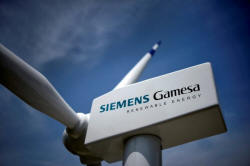U.S.-China tariffs threaten European capital goods
supply chains
 Send a link to a friend
Send a link to a friend
 [August 03, 2018]
By Esha Vaish [August 03, 2018]
By Esha Vaish
STOCKHOLM (Reuters) - European capital
goods companies are starting to show the strain of Washington's trade
conflicts with China and other countries, as tariffs push up costs for
machine parts and raw materials and threaten to worsen supply
bottlenecks.
Makers of machines that rely on thousands of small parts from around the
world - from Swedish lawnmower maker Husqvarna <HUSQb.ST> to
wind-turbine manufacturer Siemens Gamesa <SGREN.MC> - are feeling the
effects on their supply chains.
Carmakers, directly in the firing line with tariffs on cars built in the
United States for export to China hiked to 40 percent, have already
raised the alarm on profits and price hikes.
But analysts estimate that between 65 and 80 percent of the $34 billion
of affected goods shipped from the United States to China are not sold
directly to consumers but are rather key components used in other
products.
"While some of the 'direct' financial exposures are quite limited, we
believe that it is the 'indirect' effects that could be more
meaningful," Morgan Stanley capital goods analysts Ben Uglow and Lucie
Carrier wrote in a note published this week.

"So far, most companies have not provided much details regarding the
risks related to these tariffs whether this is in terms of their supply
chain or direct exposure - and we see this situation as an overhang to
our sector currently."
Investors in European capital goods companies, which have been riding a
wave of global economic growth, have not really flinched so far.
After the U.S. announced steel and aluminum tariffs on March 8,
investors fled industrial funds during March and April. But they made a
U-turn and returned in May, Thomson Reuters Lipper data showed. https://tmsnrt.rs/2n5vxCu
Furthermore, the Dow Jones European industrial goods and services index
<.SXNP> has outperformed the wider European stocks index <.STOXX> by 2
percent since the latest tariffs were imposed on July 6.
RISK RISING
Michael Nicol, European equities investment manager at Scottish asset
manager Kames Capital, is an outlier, having significantly cut exposure
to the industrial sector over the past nine months, also due to
already-full valuations.
"It is impossible to accurately predict the final outcome of the various
proposed tariffs but for the portfolio manager clearly market and stock
specific risk has increased," he said.
Morgan Stanley estimates that machinery, engineering and lighting groups
are most vulnerable to tariffs among European capital goods companies.
It singled out Wartsila <WRT1V.HE>, Siemens <SIEGn.DE>, GEA <G1AG.DE>,
Kion <KGX.DE>, IMI <IMI.L>, Rotork <ROR.L>, Osram <OSRn.DE>, Weir <WEIR.L>,
Senvion <SENG.DE>, Schindler <SCHP.S>, Signify <LIGHT.AS> and Zumtobel <ZUMV.VI>
The new U.S. tariffs impose duties of up to 25 percent on 818 categories
of Chinese goods ranging from plastic tubings and parts used for
connectors to printed circuit boards and medical imaging equipment.
Supply for electrical goods firms is most at risk, Morgan Stanley says,
as China makes nearly half of the world's printed circuit boards, used
in computers to transformers to medical equipment, and a fifth of all
electronics.

German industrial group Siemens <SIEGn.DE> said on Thursday it saw a
risk that its customers would slow spending because of supply-chain
issues.
"We see potential clouding on investment dynamics due to geopolitical
tensions in some areas," finance chief Ralf Thomas told analysts.
[to top of second column] |

A model of a wind
turbine with the Siemens Gamesa logo is displayed outside the annual
general shareholders meeting in Zamudio, Spain, June 20, 2017.
REUTERS/Vincent West/File Photo

"In particular, threats to free trade by tariffs are an area of concern. The
global supply chains are deeply interconnected, and it's of utmost importance to
have reliable framing conditions to foster confidence and economic growth,"
EARLY SIGNS
A few firms have started to indicate how they may handle the new reality.
Medical technology company Siemens Healthineers <SHLG.DE> is changing its supply
routes to ship parts from its European factories instead of its Chinese
factories to the United States, where it assembles final goods.
"We have the ability to redirect supply from China via Europe to U.S. so (that)
we do not see a significant impact from the tariffs topic," CFO Jochen Schmitz
told journalists on a results call on July 30.
For example, Healthineers has two sites where it manufactures the
superconducting magnets used in its MRI systems: one in Oxford in England and
one in Shenzhen in China.
Husqvarna is seeking to switch sourcing for lawnmower components and engines
that it imports from China and other Asian countries, while food-processing
equipment maker GEA said it would look at reshuffling its procurement of Chinese
parts used in its new equipment and service units.
The most common response so far, however, is raising prices, especially among
those who require large amounts of steel and aluminum, which have become more
expensive in the United States because of tariffs on Chinese and European
metals. Lighting maker Signify, lock maker Assa Abloy <ASSAb.ST>, construction
equipment and trucks maker AB Volvo <VOLVb.ST>, steel wire maker Bekaert <BEKB.BR>
and Scottish engineering company Weir have all said they will adopt this
strategy.

Electrical equipment maker Schneider Electric <SCHN.PA> flagged some shortages
of electronic components in its secured power business and forecast that first
extra costs linked to U.S. tariffs could reach 20 million euros.
"We have inflation popping up everywhere in our procurement... and we need to
make sure that we absorb the impact of tariff increase," Deputy CEO Emmanuel
Babeau told analysts. "We are going to accelerate further on price increases."
But that is a dangerous strategy with a risk of hurting demand.
Siemens Gamesa, already hit by the phasing out of government subsidies, said it
was unlikely to be able to pass on the higher steel costs for wind turbine
generators. "We are operating in very competitive markets," CFO Miguel Ángel
López told analysts during an earnings call last week. "The likelihood that we
can pass through the effects into prices - I would consider this one rather
low."
(Reporting by Esha Vaish, Johannes Hellstrom, Anna Ringstrom in Stockholm, Stine
Jacobsen in Denmark, John Revill in Zurich, Caroline Copley in Berlin and Helen
Reid in London; Editing by Georgina Prodhan and Keith Weir)
[© 2018 Thomson Reuters. All rights
reserved.] Copyright 2018 Reuters. All rights reserved. This material may not be published,
broadcast, rewritten or redistributed.
Thompson Reuters is solely responsible for this content. |